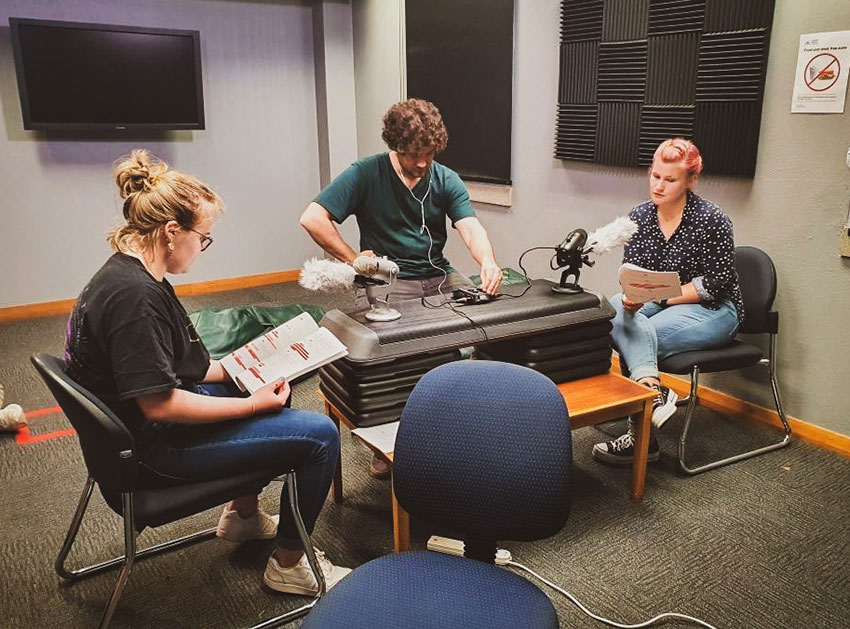A mixtape for a truly collaborative approach to bringing text-based seminar problem scenarios to life as radio plays.
Lawyers, Justice and Ethics is a compulsory course taken by students in semester 2 of their first year in the Bachelor of Laws and Juris Doctor programs. Pre-COVID, the lectures and a 2-hour weekly seminar were conducted on campus. Our challenge was to review and revise existing activities and resources to maximise engagement and outcomes in online Zoom seminars.
Law tutorials often incorporate scenario-based problem-solving activities. In Lawyers, Justice and Ethics, written scenarios are used to frame hypothetical ethical problems that students discuss with reference to legislation and regulations including the Australian Solicitors’ Conduct Rules.
The aim is to challenge students to think critically and reflect upon their own values, beliefs and biases as a prospective legal practitioner, through the analysis of realistic scenarios. Conflicts of interest, client confidentiality, and the challenge of representing clients with a very different ideology to one’s own are some of the themes explored in weeks 5-8.
“LJE tutorials are designed to be highly interactive; maintaining that level of interactivity in Zoom was the challenge before us. CLT and CEIST certainly rose to that challenge, with their production of radio plays.” Associate Professor Vivien Holmes
The written scenarios were enlivened by transforming them into 13 short radio plays, each under 5 minutes. Characters and dialogue were developed based on the existing scenario narratives and formatted as authentic scripts including scene transitions and parentheticals to convey the characters’ tone and emotion. Transcripts were also provided to students to supplement the audio which was played in class.
In true collaborative style the team that brought this project to fruition consisted of Associate Professor Vivien Holmes, Convenor of Lawyers, Justice & Ethics, staff from the Centre for Learning and Teaching (CLT), the College Education and Innovation Support Team (CEIST) from ANU College of Law, and ANU Law students.

Why radio plays, not video? Radio plays can be produced in a relatively short timeframe at low cost. There was no budget available for this project and limited time as it was mostly completed in session.
Students from the ANU Law Revue generously donated their time to fill the majority of the acting roles and the project team used their networks to fill others, including a professional news reader, clinical psychologist and ANU staff. Many of the characters were recorded separately and combined into scenes, along with sound effects and transitions, during post-production.
Listen to some of the audio scenarios below:
Like all multimedia resources, some tutors had issues with screen-sharing on Zoom. We think a little more practice and trouble-shooting with settings will ensure that these challenges can be overcome easily.
The plays could even be further developed into animated videos in future using an application such as Powtoon.
“The radio plays worked really well to engage the students emotionally in the scenarios. The tutors also enjoyed them. We’ll definitely be using the plays long-term, even after returning to face-to-face tutorials. It was also particularly fitting to have latter year law students playing the characters (thus getting them to revisit ethical issues and think about how they might be resolved!).” Associate Professor Vivien Holmes

We surveyed students in the mid-semester break and asked them to give feedback on the radio plays. Here are some of their comments:
“I really enjoyed it. I felt like it provided useful insight into what working in the legal profession could be like.”
“I quite like the radio plays. They ask relevant questions and expand the topic into scenarios we wouldn’t typically consider (E.g. personal bias in immigration law).”
“It’s an interesting and fun idea…”
Summary of Facilities and Equipment
Recording venue: We used the One Button Studio in the Chifley Library.
Equipment: Zoom H5 Recorder + Sony Lavier Mics (owned by CEIST/CLT).
Good sound can be recorded using mobile phones voice memo functions or using gaming/zoom headsets – as long as you are in a quiet space – equipment is not a barrier.
Production: Sound effects were sourced from the Envato Elements online stock library, through CLT. Post-production was done using Adobe Audition.
Further Reading: If you would like to delve deeper into the topic please see the following articles: “Engaging Tutors and Learners through Audio Supported Pedagogy” from the University of Hertfordshire an “Teaching in a Digital Age: Audio” by Anthony William Bates.
November 2020
Sharon Elliott is an Educational Developer and Dale Newbery is a Educational Support Officer, both from the CEIST team in the ANU College of Law
Kelly Frame is a Educational Designer and Rafael Florez is a Multimedia Specialist, both from the Centre for Learning and Teaching.

